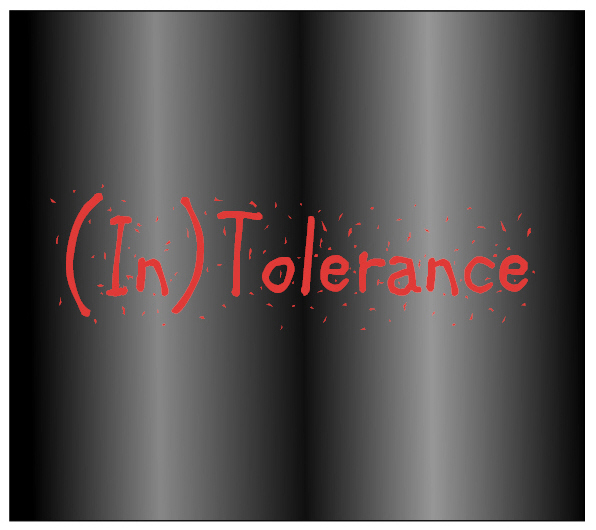
The Living Contradiction: (In)Tolerance
If you claim you are tolerant, yet you will not tolerate my beliefs, then by definition you are intolerant. That is not to say you must tolerate everyone and everything to qualify as being tolerant. Striking back at someone that has attacked you is merely self-defense. Or maybe another way of looking at it would be you are allowed to be intolerant of others if they are intolerant of you. And the one that is initially intolerant should be the one that is scorned, ostracized, or otherwise disciplined. Now, if you admit you’re intolerant, yet seek to justify why your intolerance should be acceptable, you’re essentially delving into a vast gray area between tolerance and intolerance where an individual’s subjective point of view is the determinant of acceptable intolerance.
It is within this gray area of acceptable intolerance in which we each reside with our own ideologies. We can pretend or even claim that we are tolerant of others, and for some that may be relatively close to truth. But it is unlikely we would ever hear from such tolerant individuals.. Because the very nature of virtual tolerance would be for that individual’s acceptance of another individual’s point of view. It would simply be from their deep understanding that each of us have our own opinion on any given subject and therefore should be tolerated.
So when you experience people whom are screaming at each other about how intolerant the other is, just remember the old adage about how when someone is pointing a finger there are three more pointing back at themselves. A great example of this from opposing sides might be between a person of faith (Christian, Jew, Muslim, take your pick) and a member of the LGBTQ+ community. The person of faith is intolerant of the LGBTQ+ member and vice versa. Now, depending on your personal belief, ideology, upbringing, you would qualify either one or the other as intolerant. Or, you might qualify both as intolerant. I would qualify both as intolerant but that is simply my personal perspective.
While most of us really do not want to be categorized as intolerant, we are doing a disservice to ourselves and society when we outright deny that we are intolerant to some degree. It would be the same as hypocrisy, racism, classism, sexism, etc. Each of these are not something that an empathetic individual would be proud of, but each of us likely has some level of struggles with them at some point, at least in our youth and young adulthood. It is only through introspection, a deeper understanding of ourselves, and wisdom that we can overcome these and other shortcomings.
Intolerance need not necessarily be tolerated. When intolerance is espoused by someone that is steeped in counter intolerance, we should call that out. But careful when defending one or the other. It is quite likely you are in that gray area where your bias is swaying your defense. Rather, do your best to help each side understand that while their ideology might be different, acceptance of the other’s point of view is where they get out of that gray area and enter true tolerance. And within the realm of tolerance we can live loving, empathetic, and joyful lives.
If you yourself are not capable of answering “Yes” to the question, “are you capable of tolerating my intolerance?”, then you’re not ready to offer guidance to others. You’re still stuck in the mindset that you are right, and therefore others that have contradicting views must be wrong. But being tolerant of others’ beliefs does not mean we must be accepting of those beliefs. Some of the most extreme forms of intolerance are widely regarded as unacceptable. And, likely, rightly so. But what is regarded unacceptable intolerance in some cultures might be predominantly viewed as acceptable tolerance in other cultures. Take the largely Muslim societies within the world. Former Iranian Pres. Mahmoud Ahmadinejad claimed there are no homosexuals in Iran. That’s really not a surprise. When the punishment for being gay is to be thrown off a building to their death, most people would claim to not being just about anything. In Iran, that is widely accepted intolerance. We Americans see that as unacceptable intolerance. If someone in America is targeted based on their race, sex, sexuality, we classify that as an unacceptable intolerance, going so far as to give it its’ own classification, “hate crime.” A small minority may view it as acceptable, but not we, the American Society.
So where exactly should the line be drawn between what is tolerated, and what is not? This is an impossible question to answer. The simple fact that the vast majority of us reside in that gray area, that only hardliners and the enlightened are not a part of, makes it impossible to provide a clear-cut answer. Maybe it is impossible to answer because we are asking the wrong question. Maybe we should be asking ourselves, “How does (insert topic) affect my day-to-day or society as a whole through the decades?” If there is no clear affect perceived, then maybe tolerance can be exercised. If others perceive a clear affect, we should let them speak and do our best to understand their point of view. They may have a more clear understanding of a particular subject because of their life experience. Maybe, just maybe, we might learn something ourselves.